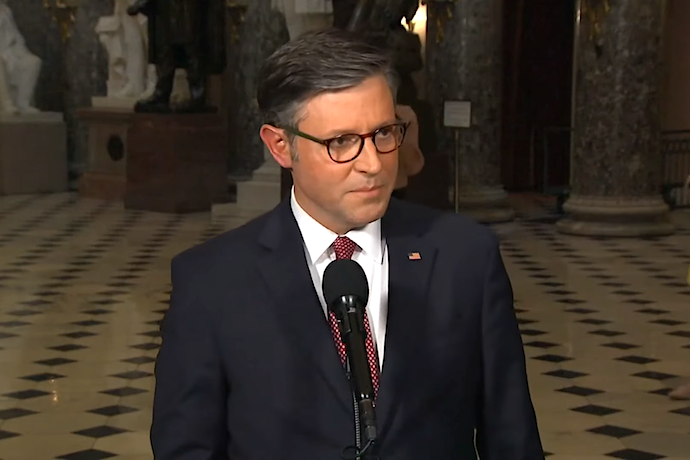When Speaker of the House Mike Johnson pushed through aid to Ukraine this week, it did more than green-light funds to support the Ukrainians. In recent weeks, he changed from hard-core opposition to supporting Ukraine to championing its cause. His actions were, of course, political and personal, but they also signal a genuine conflict within American evangelicalism, one that could have ramifications for the upcoming presidential elections.
At the beginning of 2024, mention of a report on Russian persecution of Ukrainian Christians started showing up in some evangelical publications, mostly notably in a February 6 story in Christianity Today. The report, “Faith Under Fire: Navigating Religious Freedom Amidst the War in Ukraine,” was published in November 2023 by Mission Eurasia (an evangelical mission agency founded when the Soviet Union collapsed) outlining church closures; destruction of church buildings; kidnappings; imprisonment and torture of religious leaders; and the murder of priests and pastors.
Religion doesn’t get a lot of attention in the mainstream press. There have been scattered stories about this since the beginning of the war in a few more liberal religious publications like Baptist News Global and Christian Century, but the evangelical press has mostly avoided Ukraine stories, favoring a kind of both-sides approach to the issues.
In October 2023, Christianity Today reported on how evangelicals were supportive of Ukraine when the war started. But those views changed as media figures like Tucker Carlson began to circulate Russian propaganda at conservative Christian political gatherings, accusing Ukraine and Zelenskyy of persecuting the Russian Orthodox Church. As CT writes:
“The Zelensky government has raided convents, arrested priests—has effectively banned a Christian denomination,” Carlson claimed, referring to the Ukrainian branch of the Russian Orthodox Church.
Many evangelicals, who developed a love affair with Vladimir Putin over the Trump years, were either willing to listen or, in some cases, quick to embrace Carlson’s message. (I’ve written about evangelicals and Putin here, here, and here.) While 77% of evangelicals supported Ukraine when Russia invaded, that enthusiasm eroded over the next two years. Indeed, by October 2022, an article by the World Evangelical Alliance on global evangelical support of Ukraine notably omitted any mention of support from American evangelicals. In late 2023, one poll determined evangelical support for Ukraine aid stood at 28%. A few American mission boards with significant European presence—like Mission Eurasia and Greater Europe Mission (basically the OG of American missionary work in Europe)—remained active in their support of issues related to Ukraine, but their calls for evangelical attention to issues of persecution seemed largely unheeded.
In general, American evangelical public opinion became clouded. It appears that in the last two years, the more evangelicals committed to Christian nationalism as a political movement, the more they began to back away from Ukraine and re-embrace Vladimir Putin. As a result, evangelical opposition to Ukraine and support for Russia essentially took over the issue, and elevated the pro-Putin, anti-Ukraine evangelical members of Congress, like Georgia’s Marjorie Taylor Greene, to superstar status.
By November 2023, however, pro-Ukraine groups figured out the key to American aid in their war was swaying evangelicals. Shifting evangelicals would shift overall public opinion and might change the votes of congress members representing districts with strong evangelical representation. From the end of last year until now, there’s been a steady, persistent attempt to do just that. And much of that pressure was directed toward Mike Johnson.
The number of stories about Russian persecution of evangelicals appearing in the religion press increased. A good example of this can be found in The Baptist Press—their Ukraine coverage increased in its political content, urgency, and frequency beginning in the autumn of 2023 through this spring.
And this trend slowly made its way into the mainstream, including this piece broadcast on April 10, 2024, by the PBS News Hour:
The effort to shift evangelical opinion seems to have come from several directions—from Razom, a human rights organization, supported in part by the progressive Open Society Foundation, to the ultra-secretive Family, an influential and controversial evangelical group that backed Ukraine as a potential “Bible belt” bulwark against European secularism.
These odd bedfellows did, indeed, nudge the public narrative in the last few weeks—and increasing public awareness of Russian persecution in Ukraine certainly helped move Mike Johnson to change his mind. On April 21, the House finally passed its Ukraine aid bill.
Was Ukraine a test case?
Until this vote, a Venn diagram of MAGA, the Freedom Caucus, and congressional evangelical Republicans was essentially a circle. But in the days before the vote, it became obvious that there was a split on this issue. Marjorie Taylor Greene, one of the most vocal and extreme evangelicals in Congress, appeared on Steve Bannon’s show, insisting that Russia was a champion of religious freedom and Ukraine was its enemy:
Let’s talk about what this really is, Steve: This is a war against Christianity. The Ukrainian government is attacking Christians; the Ukrainian government is executing priests. Russia is not doing that; they’re not attacking Christianity. As a matter of fact, they seem to be protecting it.
Indeed, Greene has been attacking Mike Johnson’s faith, saying on X (formerly Twitter) that he “can’t follow Christ” because of his approval of a recent budget bill. She believes that Johnson, the most openly evangelical Christian nationalist to ever occupy the Speaker’s chair, isn’t sufficiently Christian enough—and has given himself over to a “woke” agenda.
Sarah Posner, longtime observer of the Christian far-right, took note of the Johnson/Greene faith battle in her MSNBC column. Indeed, this is beginning to look like a political divorce with Johnson breaking up with Greene, the congressional stand-in for Trump’s Russia policy.
The upshot? There are two evangelical factions in the GOP—Greene’s pro-Trump, pro-Putin, populist MAGA, Steve Bannon group; and Johnson’s (also) pro-Trump, Russia-skeptical, establishment Washington, Tony Perkins evangelical crowd.
I know it’s difficult for many Americans to find daylight between these two groups, but there are real tensions here—occasionally in policy and always in style. But the rift was out in the open this week around Ukraine. And it wasn’t pretty. When evangelicals argue politics, it isn’t just about policy. It usually comes down to accusations about how good a Christian one’s opponent is—and excommunicating them from evangelicalism.
This week showed that the old establishment evangelicals still have some chops and may not have completely caved to the new MAGA rebels. Perhaps they’re testing the political water—knowing that Donald Trump is too preoccupied in New York with the Stormy Daniels hush money trial to notice that they just kicked him in his anti-Ukraine policy bottom.
Whatever the case, however, the once-backbench Johnson, now holding the Speaker’s gavel, has seemingly transformed himself from a pro-Insurrection, MAGA, Moscow Marjorie kind of guy to a polished, genteel, insider evangelical with ties to the elite Family.
This week, the issue was Ukraine. But that’s not the only crack in the evangelical coalition. There’s increasing tension over abortion between the establishment types who would like a national 15-week ban on abortion with exceptions for the health of the mother (and perhaps rape and incest) and the abortion abolitionists who want to not only outlaw all abortion and contraception, but to criminalize both.
And then there’s Donald Trump. Nobody knows what this New York trial will bring in the coming weeks. The MAGA evangelicals will stand by their man, but evangelical establishment types are dreading salacious testimony about Trump’s adultery with a Playboy model and a porn actress. They might have thrown their lot behind Trump, but they also know they’re playing a dangerous game. The more unpredictable and unpalatable he becomes, the less likely they are to hold power.
And they love power. Most establishment evangelicals do indeed believe in the project of transforming America into a Christian nation in their theological image. But they know that will take a long time. Key to their ultimate success is hiding in plain sight—like the Family—and passing as regular Washington insiders while amassing institutional power and slowly changing the nation from the center out. Incremental change, not instantaneous. When it comes to a Christian America, establishment evangelicals prefer evolution over revolution. Stealth is their thing.
Was Ukraine a test case for the establishment types to see if they could still leverage enough power in the House of Representatives to undermine the evangelical MAGA populists? To bring Johnson into the gradualist camp and shed his past associations?
I don’t know. It’s certainly possible. If I were Marjorie Taylor Greene, I’d be worried; there are signs that the evangelical establishment wants to throw her under the political bus. (Maybe she should hire a food taster?) In an election year, they’d like to turn down the extremes and try to pass as moderates again. But, if the evangelical coalition is purging itself, there’s no telling what might happen in November. That could be bad news for Donald Trump.
But he’s probably too busy with Stormy to notice that Mike Johnson seems to be breaking up with him.
This essay first appeared on The Cottage and is republished with the generous permission of the author.





